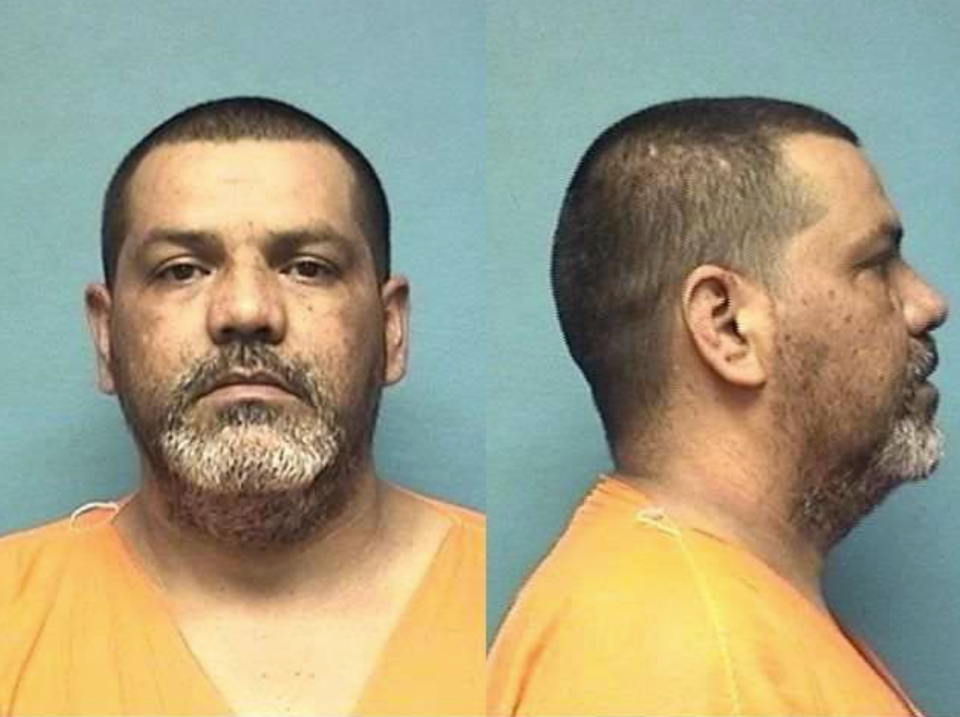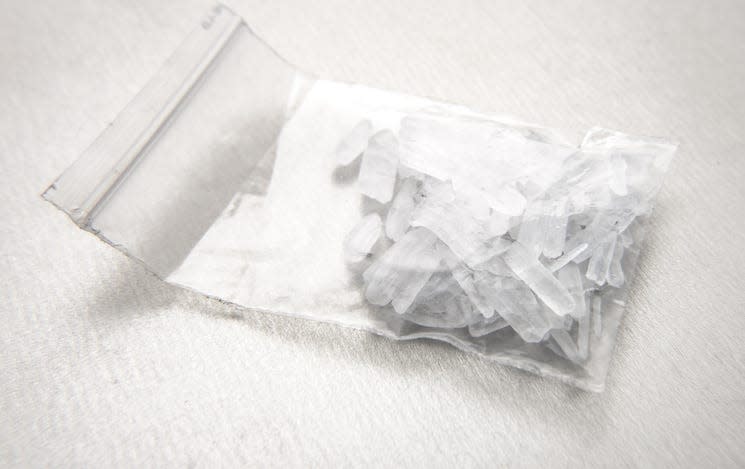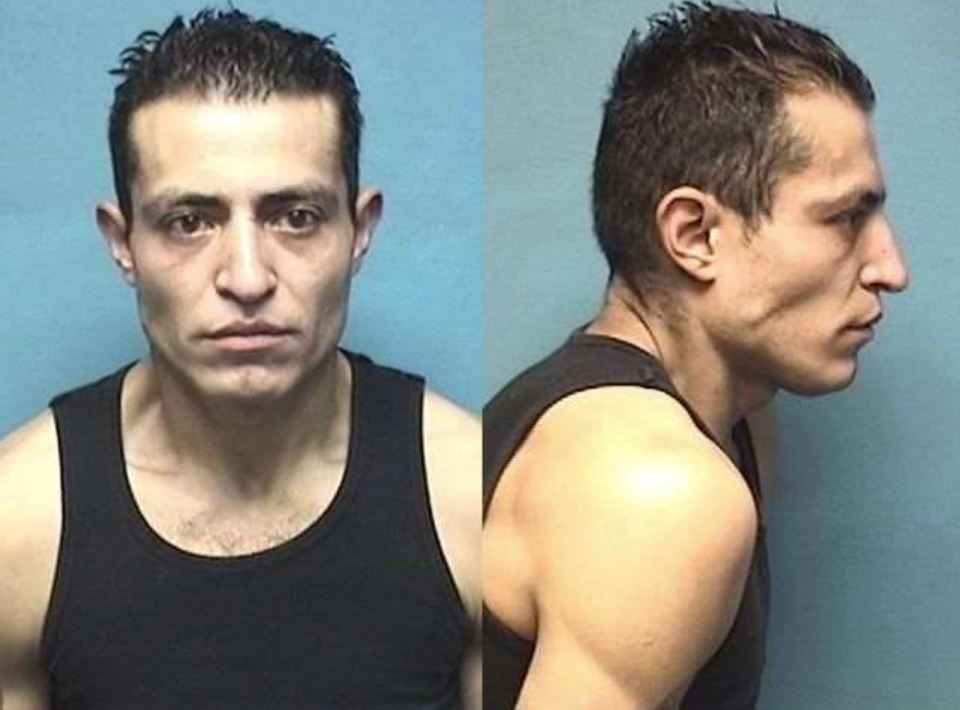Kansas City drug trafficker: Mexican cartel made me do it
A Mexico native sneaked into the U.S. and settled into a quiet suburb of Kansas City, Missouri, where he oversaw the flow of millions of dollars worth of cartel drugs. He claims he had no choice.
Investigators believe Abel Miranda Diaz, 48, left Mexico years ago and moved to the town of Raymore, a suburb of fewer than 23,000 residents about 30 minutes southeast of Kansas City. He helped move heroin, meth and cocaine for a Mexican cartel for about five years before agents with the U.S. Drug Enforcement Administration and Homeland Security Investigations toppled his drug ring.

Miranda's case illustrates how Mexican cartels target small U.S. towns as well as large cities to profit off the deadliest drug epidemic in American history. The case also involved a large-scale meth conversion lab, emblematic of a growing trend to make it easier for cartels to sneak meth across the border.
After his arrest, Miranda Diaz talked to investigators about his crimes ― claiming a cartel in his home state of Michoacán forced him into the drug trade. He pleaded guilty in September to drug trafficking charges in federal court. But agents and prosecutors don't believe he's owning up to all that he has done.
That includes faking his identity.
According to court transcripts, while standing before a federal judge, he still insisted his true name is Baldemar Rodriquez-Zaragoza, though agents consider it one of his aliases.
He also claims he lived in a modest one-bedroom tan home in Kansas City, Missouri, with his aunt. Agents say he lived in the suburbs, but often stayed at a stash house, a place used to store drugs, across the Missouri River in Kansas.
Miranda Diaz admitted getting drugs from a Mexican cartel and trafficking them in Missouri and Kansas. But he didn't own up to being the leader of the area drug network, even though agents argued they had proof he gave the orders and his drug ring associates referred to him as "El General," or "El Jefe," Spanish for "The Boss."
He also denies having anything to do with a sawed-off shotgun found near drugs inside a stash house. Investigators insist his ring used it to guard the drugs.
So, while he admits he trafficked drugs, he feels he got too much time in prison when a judge sentenced him in March to serve 27 years behind bars, said his attorney, Charles Lamb, who declined to discuss the case. Miranda remains in an Illinois prison, while his attorney appeals his sentence.
Agents previously caught Miranda in the U.S. twice, using aliases. He was deported but kept finding a way back. The Courier Journal sifted through court records and transcripts and interviewed an associate's father to learn more about the Miranda case.
Investigators found a large meth conversion lab
The DEA and Homeland Security Investigations agents had suspected Miranda was a large-scale drug trafficker as early as 2015, but they lacked the proof, according to a criminal complaint filed by a DEA agent. Miranda dodged prosecution during two big rounds of indictments in 2015 and 2017 in two cases targeting drugs imported from Mexico.
One method Miranda used to thwart police involved using aliases, including "Luis" or "Baldemar." And members of his drug ring found creative places to hid drugs, including in a children's cereal box.
But Miranda's luck wouldn't hold. A betrayal was coming.
Investigators got a major break in August 2018, when a drug associate confided in HSI agents, agreeing to be a criminal informant.
Agents convinced a federal judge to authorize wire taps to listen in on phone calls. They began following Miranda and noted he often spent hours inside a Kansas stash house, a 1,448-square-foot tan trailer home with black shutters and a sprawling front yard in a middle-class Kansas City neighborhood near a church and a youth center.

Agents used the informant to monitor drug buys and gather crucial evidence from 2018-20. On five occasions, the informant ordered drugs and agents watched as they were delivered by Miranda associate Rodolfo Yanez Sotelo.
"Yanez-Sotelo wasn't sitting on a large amount of meth" inside a drug stash house, his attorney argued in his sentencing memo asking for leniency.
"Yanez-Sotelo was little more than a middleman or gofer for Miranda Diaz."
Yanez didn't have any prior federal convictions, his attorney argued. But he was arrested in July 2020 in Minnesota for driving drunk, flagging police who were looking for him in the federal drug case in Missouri, court records show.
On March 18, 2020, agents watched a drug deal go down between two of Miranda's associates. Christopher Aldana Vergara, 33, hauled two kilos of heroin and two kilos of meth from Missouri to Kansas to Sergio Villegas Sandoval.

Investigators confiscated the drugs and arrested Villegas, a 44-year-old Mexican national who lived in Kansas City, Kansas. Then, they followed Aldana to his home in Independence, Missouri. When he left again, agents pulled him over, arresting him before he could get out of his blue BMW.
In the driver's floorboard, they spotted a brick-shaped kilo of cocaine. He also had more than $2,800 in cash, which agents classified as drug profits.
Agents found Miranda hiding under Aldana's trailer, in a suburb east of Kansas City that is home to the Harry S. Truman Presidential Library and Museum. He lied, giving a fake name and falsely claiming he had only been in the U.S. for 25 days.
Inside the attached garage, investigators found a large meth conversion lab, used to transform powder into crystallized meth or convert liquid meth into a solid form similar to rock candy, called "ice" due to its potency and its clear, hard chunks.
Cartels are relying more and more on these American conversion labs, which can be dangerous and often involve chemicals that are hazardous to the environment.
Cartels can more easily hide meth in a liquid form to sneak it across the border, often hiding it in windshield wiper fluid, in soda bottles or gas tanks. In this case, Miranda admitted that cartel members often hid liquid meth in compartments of car tires, the drive shafts of truck, in gas tanks and inside car batteries.
Inside Aldana's trailer, agents also found seven 1-gallon containers totaling 31 kilos of liquid meth, about 33 kilos of crystal meth, two kilos of heroin and drug ledgers.
Aldana pleaded guilty in 2021 to trafficking heroin, cocaine and meth.
His attorney said Aldana "has learned in the most painful of ways that the 'easier' way is certainly not necessarily the 'better' way to go in life," according to the defense sentencing memo asking for leniency.
His mother, Rosalva Vergara, wrote a letter in Spanish saying her son was always studious and shy until he began dating a 15-year-old girl when he was age 13. She got pregnant and, against his family's advice, he dropped out of school to work at a creamery to provide for his child. Vergara said the couple married and had two more children, and her son remained a hard worker and dedicated family man.
"I never had any complaints about him and he made the decision to come to this country to give his family a better life" due to few opportunities in his native country, said Vergara, who was surprised to learn of his arrest. "I do not understand when he got into this problem."
His father, Bernardo Aldana, told The Courier Journal during a recent phone interview that he and his wife believed his son ran a successful business restoring homes. But he said his son did grow more distant after leaving Mexico.
"He was a good kid, but you know what happens when you get in with bad company. They grab you when you're dumb," the father said through a Spanish interpreter.
"He got along well with the family, but he came to the U.S. and got lost."
Prosecutors argued for a long prison stint, claiming Aldana illegally entered the U.S. at least twice and oversaw the drug stash house, where they found the sawed-off shotgun.
Last year, a judge sentenced Aldana to serve 20 years in federal prison, where parole is not an option.
His father said in April that he is very worried because he hadn't heard from his son in a month, after his son was accused of stabbing a cellmate ― something Aldana denied. The father also said he believes his son should have gotten fewer years in prison.
Villegas' attorney asked for a sentence of six years, saying his client had a more minor role in the drug ring and was the intermediary between the drug importers and lower-level dealers.
Villegas, 43, has lived in the U.S. since he was age 17, though not legally. His attorney claimed Villegas and his wife have two young children, one of whom has autism, giving Villegas a financial motive to get involved in the drug ring.
Villegas, a native of the central Mexico state of Guanajuato, was the least culpable of the drug ring, his attorney, James L. Spies, told The Courier Journal in April.
"The evidence clearly indicates he was a mid-level distributor with no connection to the cartel," Spies said.
Prosecutors pointed out that Villegas was caught accepting the 4-kilo load of heroin and meth in Kansas from Aldana and that Villegas participated in the drug ring for two years.
Last year, the judge sided with prosecutors and sentenced Villegas to serve nine years in federal prison.
More: He reached 'kingpin' status by selling Mexican cartel-supplied drugs. But betrayal awaited
Miranda pleaded guilty in September to trafficking at least 1 kilo of heroin, 5 or more kilos of cocaine and 50 grams or more of meth from 2015 until his arrest in 2020.
After his arrest, Miranda talked with Homeland Security Investigations agents, but gave an alias and gave conflicting details about his culpability. Finally, he did admit to operating stash houses and participating the drug transactions.
Miranda said he was recruited by a third-party to work for a cartel based in his hometown in Mexico.
"A member of that cartel had compelled Miranda-Diaz to help the cartel deal drugs in the United States by threatening to harm Miranda-Diaz and his family in Mexico," according to the agent's criminal complaint.
Many court records remained sealed. Those that are available don't reveal Miranda's hometown or which cartel paid him.
The cartel, La Familia Michoacana, also known as LFM, had long been the dominant cartel in Miranda's home state. But it has faced many bloody turf wars in recent years, including with top rival Cártel Jalisco Nueva Generación, a global powerhouse known as CJNG or the Jalisco Cartel.
Prosecutors argued in court that Miranda played the biggest role in the criminal network, meriting the most severe sentence.
When he is released, he will again be deported.
This article originally appeared on Louisville Courier Journal: Kansas City trafficker claims Mexican cartel forced him into drug trade

